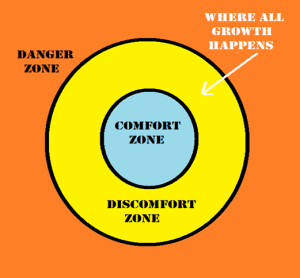 If you want team growth, you have to find a way to make your people feel a bit of discomfort.
If you want team growth, you have to find a way to make your people feel a bit of discomfort.
The most powerful catalyst for individual or team development is getting people out of their comfort zone and experiencing or doing something new.
I once had a basketball player who had always played guard and handled the ball very well. The summer of her sophomore year, though, she grew four inches and became our tallest player.
Although she had never played post, and was at first fearful and unsure of the new and expanded role she would play, she was also soon excited to add to her skill set.
You likely know someone in your organization that reminds you of that player.
Maybe she reminds you of yourself.
As a leader or teammate, you will find that there are four distinct steps that any person will go through as they deal with discomfort.
While it is the key to growth and improvement, people don’t always greet it cheerfully.
In fact, the first step in dealing with discomfort is fear.
PEOPLE ARE FIRST AFRAID of what makes them uncomfortable.
The second step is when PEOPLE EVENTUALLY BECOME WILLING TO EXPERIENCE DISCOMFORT.
The third step is when PEOPLE BECOME COMFORTABLE WITH THE DISCOMFORT.
The final step is when PEOPLE ARE EXCITED BY AND CRAVE DISCOMFORT. This is simply a sign that their zone lines have shifted, and they have established a much larger comfort zone than they previously enjoyed.
Of course, with the final step comes the realization that what they now crave has become comfortable for them, so in order to continue to grow and develop they will need to find a new area of discomfort to start the process with.
All personal and professional GROWTH occurs in the discomfort zone.
And as a leader, your job is to recognize the sometimes very thin line between a person’s discomfort zone and their DANGER ZONE, which could easily cause them to shut down.
During every business team building event I have facilitated, there have been people who began the day unsure and uncomfortable and later left craving more of the experiential activities and discussions they had experienced.
Like a child beginning to walk, we should encourage our people, and ourselves, to take just “one more step” beyond our current position. That discomfort is healthy and exhilarating.
It often also requires that someone offers encouragement and reaches out to keep them steadyand assure them that they are supported and safe.
Interested in growing your team?
Pick a hard-working person on your team who is interested in being “coachable” – and then look for opportunities to add to their responsibilities and encourage them to seek out new experiences. The best way to grow team leaders is to find good leaders and make them better.
It really is as simple as identifying a new skill that would benefit someone on your team that is not too far a stretch from their current talents, and asking them to take on that challenge so they can contribute more to the team.
Yes, they will go through the four steps of discomfort and growth:
- Afraid of it
- Willing to experience it
- Comfortable with it
- Craving it
They will also become tremendous examples to their peers of what a positive and powerful effect that moving past that initial fear and being willing to experience and learn from discomfort can have.
Different team personality types and leadership styles may require that you present the opportunity is different ways… but ultimately it will be to their benefit to step outside their comfort zone and try something new.
Grow your team as individuals first – and those individuals, once they have identified a compelling goal and built relationships, will surprise you.
If you are looking for conference ideas or planning a group event in the future, consider a team building speaker to help inspire your people with interactive message. Paired and whole group activities will allow them to have laugh while they learn and grow as leaders.
Is there a time that you or your team has grown through discomfort?
Leave a comment below…
